No products in the cart.
Great news! The Canada Post strike is over! We’re resuming deliveries to Canada!
Excellente nouvelle ! La grève de Postes Canada est terminée ! Nous reprenons les livraisons vers le Canada !
Great news! The Canada Post strike is over! We’re resuming deliveries to Canada!
Excellente nouvelle ! La grève de Postes Canada est terminée ! Nous reprenons les livraisons vers le Canada !
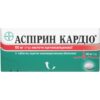
Aspirin Cardio enteric-coated ...
$19.79 Original price was: $19.79.$17.99Current price is: $17.99.

Trombo ASS enteric-coated tablets, 100 mg each, 30 pcs.
$24.39 Original price was: $24.39.$22.19Current price is: $22.19.
Free Worldwide Shipping
Estimated delivery:
14 - 21 days
Categories: Hematopoiesis and blood
Brand: Gerot Lannach
Trombo ASS Enteric-Coated Tablets are a pharmaceutical product designed to provide effective antiplatelet therapy for individuals at risk of cardiovascular events. Each tablet contains 100 mg of acetylsalicylic acid (aspirin), renowned for its ability to inhibit platelet aggregation, thereby reducing the risk of blood clots. The enteric-coated formulation ensures that the tablets dissolve in the intestines rather than the stomach, minimizing the risk of gastrointestinal irritation and enhancing patient comfort. This makes Trombo ASS a suitable option for long-term use in managing cardiovascular health.
Trombo ACC 100 mg is an antithrombotic agent.
Indications for use
To reduce the risk:
- fatal outcome in patients with suspected acute myocardial infarction;
- fatal outcome in patients who have suffered a myocardial infarction;
- transient ischemic attacks (TIA) and stroke in patients with TIA;
- morbidity and mortality in stable and unstable angina pectoris.
For prevention:
- thrombosis and embolism after vascular operations (percutaneous transluminal catheter angioplasty (PTCA), carotid artery endarterectomy, aortocoronary bypass (CABG), arteriovenous bypass);
- deep vein thrombosis and pulmonary embolism after long-term immobilization (after surgical operations);
- myocardial infarction in patients with a high risk of developing cardiovascular complications (diabetes mellitus, controlled arterial hypertension) and persons with a multifactorial risk of cardiovascular diseases (hyperlipidemia, obesity, smoking, old age).
For secondary prevention of stroke.
Composition
- active ingredient: acetylsalicylic acid;
- 1 tablet contains 100 mg of acetylsalicylic acid;
- excipients: lactose monohydrate, microcrystalline cellulose, colloidal anhydrous silicon dioxide, potato starch, talc, triacetin, methacrylate copolymer dispersion.
Contraindication
Hypersensitivity to acetylsalicylic acid, other salicylates or any component of the drug.
- Chronic asthma caused by the use of salicylates or NSAIDs in the anamnesis.
- Acute stomach and intestinal ulcers.
- History of gastrointestinal bleeding or perforation associated with previous NSAID therapy.
- Active or history of acute peptic ulcers/bleeding (two or more separate episodes of confirmed ulceration or bleeding).
- Bleeding and hematological disorders (hemorrhagic diathesis, thrombocytopenia, hemophilia).
- Pronounced renal failure.
- Pronounced liver failure.
- Pronounced heart failure.
- Combination with methotrexate at a dosage of 15 mg/week or more.
- The last trimester of pregnancy.
- Hyperoxaluria.
Adverse reactions
From the blood and lymphatic system. Often: due to the antiplatelet effect on platelets, acetylsalicylic acid can increase the risk of bleeding. Rarely: thrombocytopenia, agranulocytosis, pancytopenia, leukopenia, aplastic anemia, iron deficiency anemia.
From the gastrointestinal tract. Often: pain in the epigastric region and abdominal pain, heartburn, nausea, vomiting, diarrhea, dyspepsia. Uncommon: gastrointestinal bleeding, as well as gastrointestinal ulcers, which very rarely can lead to perforation. Frequency unknown: Overt (hematemesis, melana) or occult gastrointestinal bleeding that may cause iron deficiency anemia (more common at higher doses).
Method of application
The drug should be prescribed to adults and children over 16 years of age. The drug should be taken internally before meals, without chewing, with a sufficient amount of liquid.
To reduce the risk of a fatal outcome in patients with suspected acute myocardial infarction, use the drug in a dose of 100 mg per day. A dosage of 300 mg per day can be used for a short time according to therapeutic indications. To achieve rapid absorption, the first tablet must be chewed!
To reduce the risk of a fatal outcome in patients who have suffered a myocardial infarction, use 100 mg per day. A dosage of 300 mg per day can be used for a short time according to therapeutic indications.
For secondary stroke prevention, use the drug in a dose of 100 mg per day. A dosage of 300 mg per day can be used for a short time according to therapeutic indications.
To reduce the risk of TIA and stroke in patients with TIA, use 100-200 mg per day. A dosage of 300 mg per day can be used for a short time according to therapeutic indications.
To reduce the risk of disease development and death in patients with stable and unstable angina pectoris: from 100 mg per day. A dosage of 300 mg per day can be used for a short time according to therapeutic indications.
For the prevention of thrombosis and embolism after vascular operations (percutaneous transluminal catheter angioplasty (PTCA), carotid artery endarterectomy, coronary artery bypass grafting (CABG), arteriovenous bypass grafting), use from 100 mg to 300 mg per day.
For the prevention of deep vein thrombosis and pulmonary embolism after long-term immobilization (after surgical operations) – 100-200 mg per day or 300 mg per day every other day.
For the prevention of myocardial infarction in patients with a high risk of developing cardiovascular complications (diabetes mellitus, controlled arterial hypertension) and persons with a multifactorial risk of cardiovascular diseases (hyperlipidemia, obesity, smoking, old age) use 100 mg per day. A dosage of 300 mg per day can be used for a short time according to therapeutic indications.
Features of application
Use during pregnancy or breastfeeding
During the I and II trimesters of pregnancy, preparations containing acetylsalicylic acid should not be prescribed without a clear clinical need. For women who are likely to be pregnant or in the I and II trimesters of pregnancy, the dose of drugs containing acetylsalicylic acid should be as low as possible, and the duration of treatment should be as short as possible.
Acetylsalicylic acid is contraindicated during the third trimester of pregnancy.
Acetylsalicylic acid and its metabolites enter breast milk in small amounts. Since no harmful effects of the drug on the child were found after taking by women during lactation, it is not usually required to interrupt breastfeeding. With long-term use of the drug or the use of acetylsalicylic acid in high doses, the issue of stopping breastfeeding should be resolved.
Children
Children under 16 years of age are contraindicated to use the drug without special indications, such as Kawasaki syndrome or disease, prevention of blood clots after cardiac operations, and prevention of myocardial infarction in high-risk children.
Medicines containing acetylsalicylic acid should not be used in children with acute respiratory viral infection (ARVI) with or without fever.
There is a risk of developing Reye’s syndrome, which is a very rare but life-threatening disease. If the specified conditions are accompanied by vomiting, dehydration, loss of consciousness and convulsions, urgent medical intervention is required.
The ability to influence the speed of reaction when driving vehicles or other mechanisms
Does not affect the ability to drive a car and work with other mechanisms.
Overdose
Overdose can be harmful for elderly patients (therapeutic overdose or frequent accidental intoxications can be fatal).
Symptoms of moderate intoxication. Dizziness, vertigo, ringing in the ears, hearing disorders, visual disturbances, abdominal pain, increased sweating, nausea and vomiting, headache, tremors, disorientation, confusion. These symptoms can be controlled by reducing the dose.
Symptoms of severe intoxication. Fever, hyperthermia, hyperventilation, dyspnoea, convulsions, respiratory alkalosis, metabolic acidosis, dehydration, pulmonary edema, rhabdomyolysis, arrhythmias, delirium, coma, cardiovascular shock, respiratory failure, severe hypo- or hyperglycemia, hypokalemia Symptoms may occur with a delay of several hours after taking a toxic dose.
Emergency treatment. Rapid hospitalization, gastric lavage, administration of activated charcoal, control of acid-base balance, alkaline diuresis (target pH of urine from 7.5 to 8.0). If plasma salicylates exceed 500 mg/L (3.6 mmol/L) in adults or 300 mg/L (2.2 mmol/L) in children, forced diuresis should be considered.
Hemodialysis in case of severe intoxication, rehydration, symptomatic therapy.
There is no specific antidote.
Storage conditions
Store in a dry place protected from light at a temperature not higher than 25 °C. Keep out of the reach of children.
Be the first to review “Trombo ASS enteric-coated tablets, 100 mg each, 30 pcs.” Cancel reply
You may also like


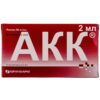
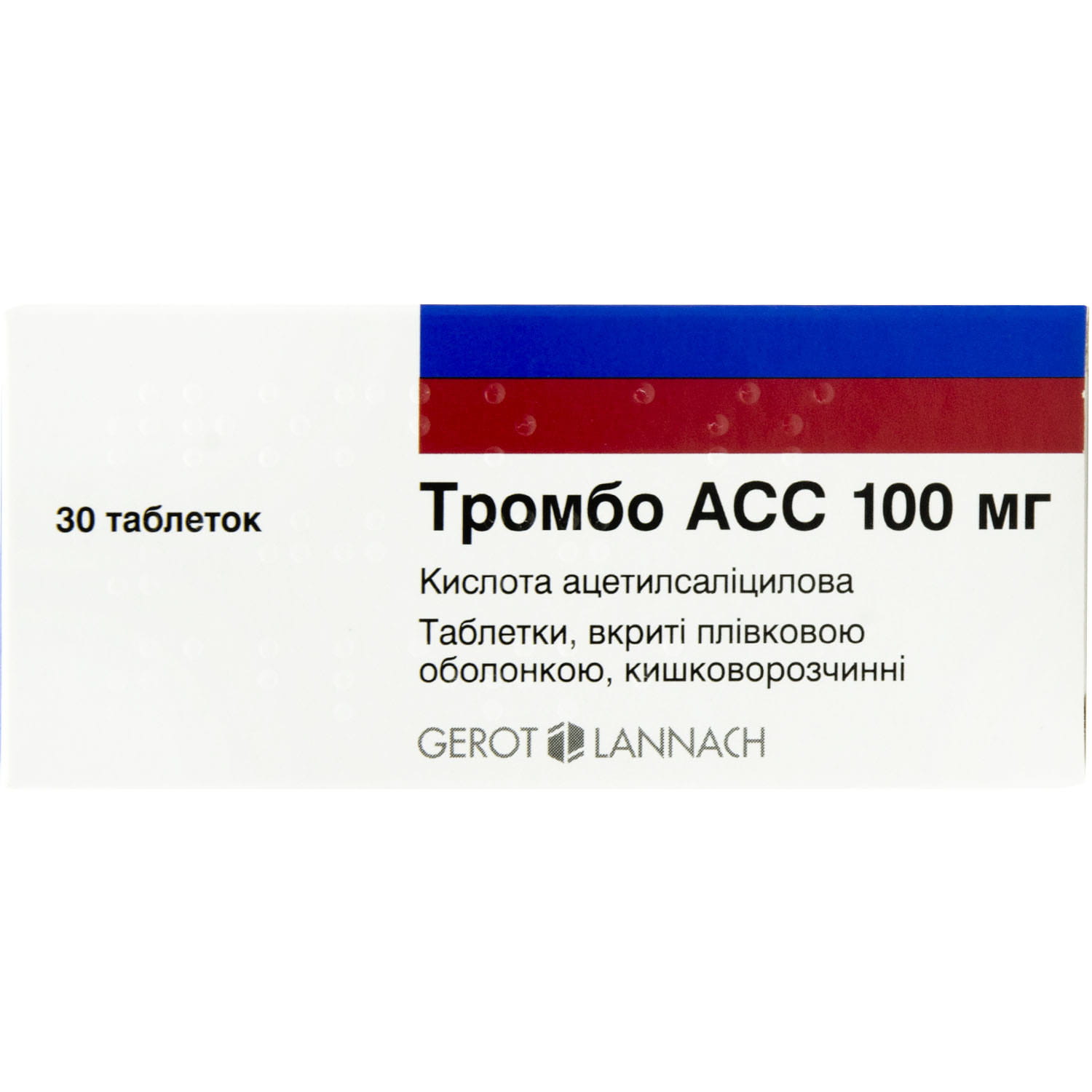
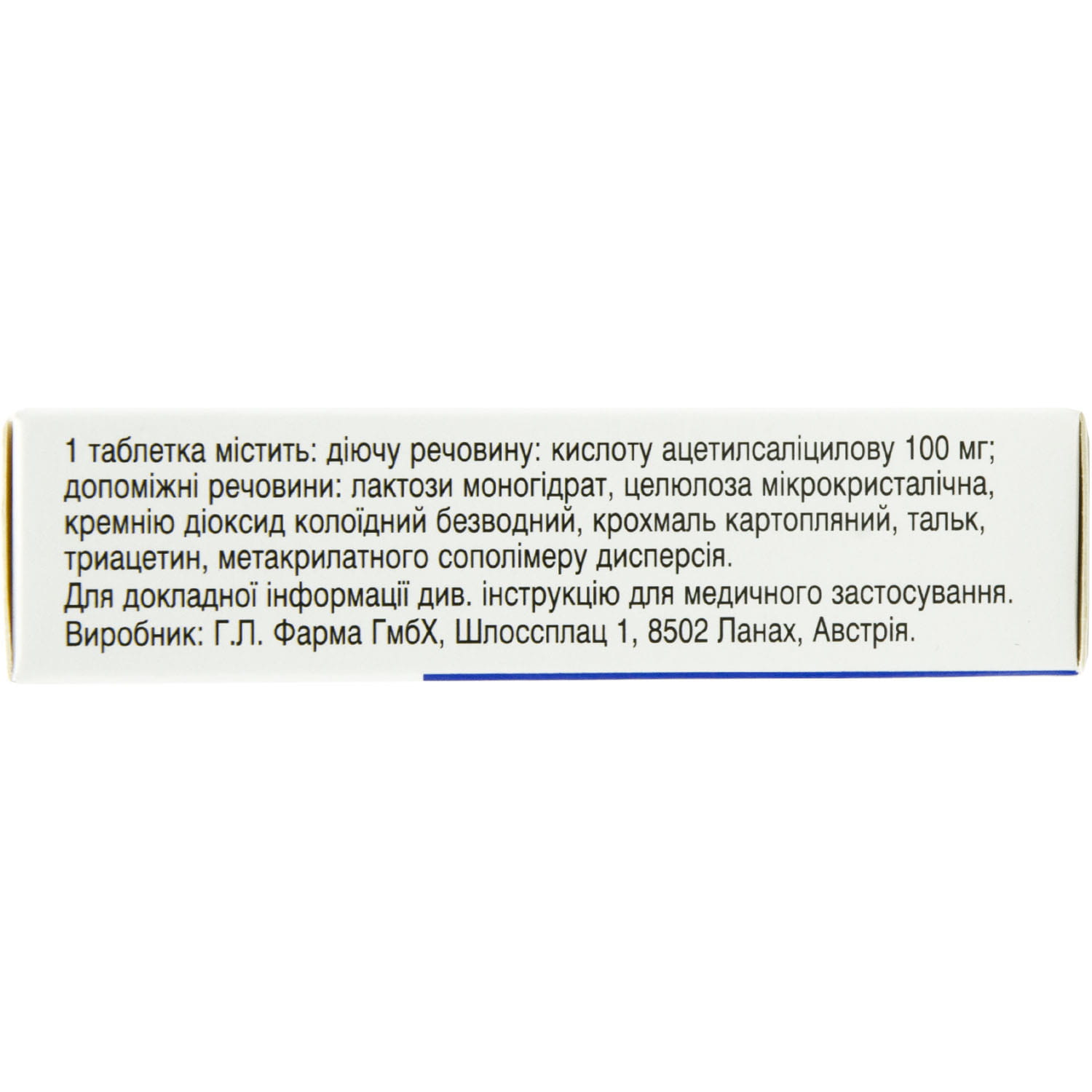
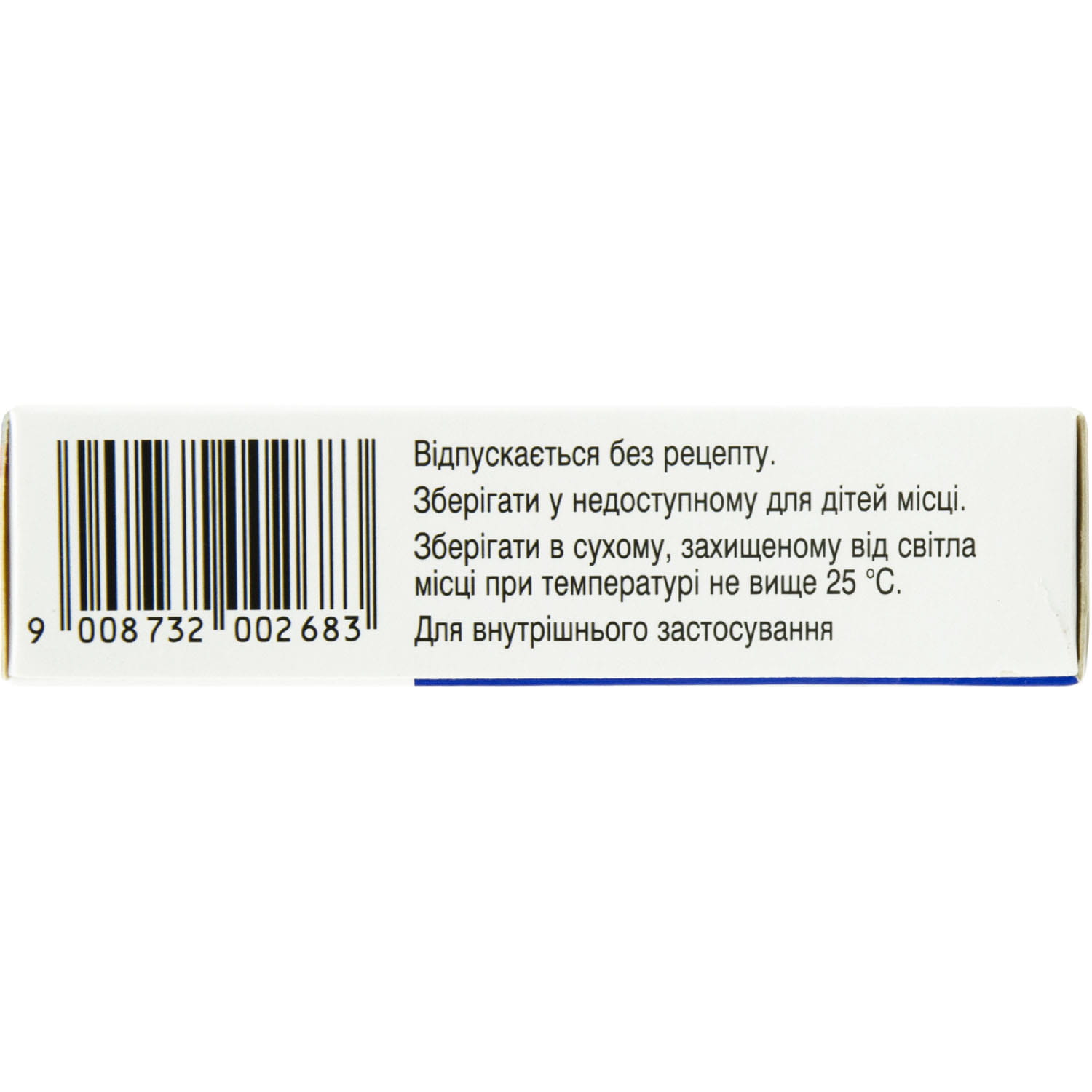
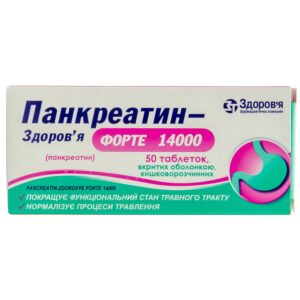
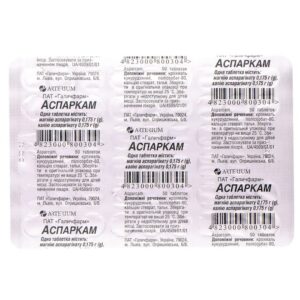
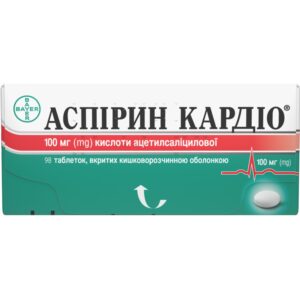
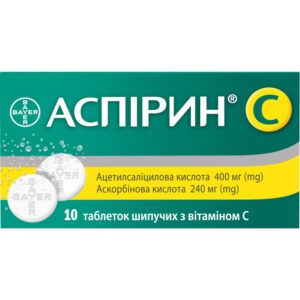
Reviews
There are no reviews yet.